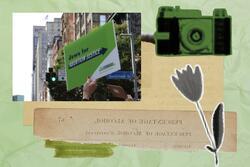Linda McCartney's Jewish, Feminist Activism
I can tell you just about any fact or story about The Beatles. To say that I like The Beatles is an understatement; the band’s discography served as the soundtrack to my childhood and initiated my love of music. It is not lost on me, however, how completely different I am from my favorite musicians. It’s difficult to identify what I, as a 17-year-old Jewish girl from Massachusetts, could have in common with four men from Liverpool, all born at least 64 years before me. But, in my search for some similarity or connection, I found someone like me: Linda McCartney.
Linda McCartney (née Eastman) was Paul McCartney’s first wife, his musical collaborator, and the subject of some of his best songs. More importantly, Linda was a successful photographer and musician, an avid animal rights activist, and a Jewish woman. Born into a Russian and German Jewish family, Linda was raised in Scarsdale, New York and graduated from Scarsdale High School in 1959. She went on to graduate from the University of Arizona as an art history major. Linda’s iconic portrait of Eric Clapton made the cover of The Rolling Stone, making her the first woman to photograph a cover.
Linda never advertised her Judaism. She didn’t grow up with much religion, her family name changed from Epstein to Eastman, and she rarely mentioned Judaism at all. Still, her heritage persisted in her children. Stella McCartney, Paul and Linda’s daughter and a successful fashion designer, has stated that her mother was Jewish, and while she herself may not be extraordinarily religious, she’s “always excited to say” that she’s Jewish.
Regardless of how Linda presented herself or practiced her religion, Jewish values are evident in her activism for animal rights. Jewish law prohibits cruelty to animals. Whether she recognized the connection or not, Linda certainly practiced this mitzvah. Her love of animals and dedication to vegetarianism appears in almost every text I’ve read about her. In an interview with the University of Arizona’s Center for Creative Photography, Paul McCartney gushed that “Linda was a very strong animal-lover, really strong—people will say, ‘Oh I love animals!’, but with her it was very deep.”
Linda’s passion manifested itself in her work. With her camera, she captured images of animal cruelty and injustice. Paul remarked in the same interview that “If it was the open back of a meat truck showing a big carcass hanging up, she would take a picture of it rather than just going ‘Yuck!’ and walking away.” Linda was also a major supporter of People for the Ethical Treatment of Animals (PETA). She and Paul McCartney won PETA’s Lifetime Achievement Award. After Linda’s passing, PETA created the Linda McCartney Memorial Award to commemorate her work for animal rights. It honors individuals who work to end animal cruelty,
Linda and Paul famously became vegetarian in 1975 and advocated for others to do the same. To bolster her movement, Linda wrote a series of critically acclaimed vegetarian cookbooks. She published Linda McCartney’s Home Cooking: Quick, Easy, and Economical Vegetarian Dishes for Today in 1980, followed by the James Beard Foundation Award-nominated Linda’s Kitchen: Simple and Inspiring Recipes for Meatless Meals in 1995. Linda McCartney’s Family Kitchen, a collection of recipes organized by Paul and his daughters Stella and Mary, was published in 2021 and nominated for an International Vegan Film Festival award. These cookbooks provided a greater level of accessibility to vegetarian cooking in an era when it wasn’t common. Moreover, she created Linda McCartney Foods in 1991 which sold prepared, frozen vegetarian meals. Her work to extend vegetarianism to a larger audience has made her an icon in animal rights activism.
As a vegetarian of seven years, I naturally appreciate Linda’s work. Like Linda, my affection for animals deterred me from eating meat and fish. I find it powerful that in addition to spreading her message and providing the world with good vegetarian recipes, she worked to make the diet more easily attainable. Her food line provides an inexpensive and quick option for vegetarians.
Despite my avid love of The Beatles, Linda McCartney’s story and legacy resonated with me surprisingly more than those of Paul, John, George, and Ringo. Her last name indicates her relationship to the rock star, but she’s easily identifiable as much more than that. I see my own Judaism, vegetarianism, activism, and artistry reflected in her legacy.
This piece was written as part of JWA’s Rising Voices Fellowship.







